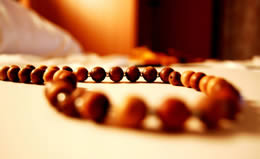
Dhikr is the essential form of prayer in Sufism (tasawwuf). In its essence, ‘Dhikr’ is the remembrance of Allah. However, the word “remember” is too pale a word for dhikr, which has now acquired a large number of associations in Sufi literature. In its verbal signification, this term implies: to remember; to praise by frequently mentioning; to rehearse; to celebrate or commemorate; to make much of; to cherish the memory of as a precious possession.
In Sufism, Dhikr represents both a profound ritual and a spiritual state of the mind and the heart, in which the devotee seeks to realize the presence of Allah. Thus, there is the Dhikr of the mind and the Dhikr of the heart. For beginners, one may lead to the other, but in many cases the two are simultaneous. There is a subtler distinction between the Dhikr that is vocal, and the Dhikr that is silent, corresponding to the two doors of the heart, the physical and the spiritual.
In Dhikr, there is the affirmation of the presence of Allah and the negation of anything else. As a human being matures on his spiritual path, the experience and the meaning of dhikr continuously evolves and matures along with his level of consciousness.
Followers of Sufism often engage in ritualized Dhikr ceremonies, the details of which may vary between different Sufi orders (tariqahs). Each order, or lineage within an order, has one or more ritualized forms for group Dhikr, the collection of which may include recitation, singing, music, sama (whirling) and tafakkur (contemplation).
On the journey to the Divine Presence, the seed of remembrance is planted in the heart and is nourished with devotional praise and glorification, until the tree of Dhikr becomes deeply rooted and bears its fruit in the heart. Dhikr is the power behind the whole journey and the foundation of the whole development. It is the reviving force from the sleep of heedlessness, the ever-present bridge to the Divine Presence.